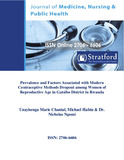Prevalence and Factors Associated with Modern Contraceptive Methods Dropout among Women of Reproductive Age in Gatsibo District in Rwanda

View/
Date
2020-11Author
Chantal, U. M.
Habtu, M.
Ngomi, Nicholas N.
Metadata
Show full item recordAbstract
The use of modern contraceptive methods is important as it assists couples to give birth to the desired number of children and space pregnancies. Government of Rwanda has put much emphasis on family planning services accessibility as one of the pillars of sustainable development. The purpose of this paper was to determine the prevalence and factors associated with modern contraceptive methods dropout among reproductive age women in Gatsibo District in Rwanda. The study employed a cross-sectional research design. The target population was 122,859 women out of which a sample size of 399 women was obtained using Yamane formula. Questionnaire, focused group discussion and key informant interview were used as data collection instruments. The findings of the study showed the prevalence of family planning methods dropout in Gatsibo district was 30.1% and they were no longer using modern contraceptive methods while 69.9% are still using modern contraceptive methods. Findings also showed that pills are the most used at 37.1% followed by injectable 27.8% and lastly IUD with 13.3%. The findings further revealed that modern contraceptive drop out was significantly more among third social class (35.8%) than first social class category (13%) as the p value = 0.002. The findings similarly indicated that women in the third class social category are 4.26 times more likely to drop out modern contraceptive method compared to those women in first social class category [AOR : 4.26 ; 95%CI : 1.79 –9.92 ; P=0.001]. The paper recommended that the ministry of health to continuously work with Ministry of Public Service and Labour to ensure the increase of health care providers so that the health care are not overloaded, and they can provide high quality of services.
URI
https://stratfordjournals.org/journals/index.php/Journal-of-Medicine-Nursing-P/article/view/624http://hdl.handle.net/123456789/4556
Collections
- Journal Articles (PAS) [273]
